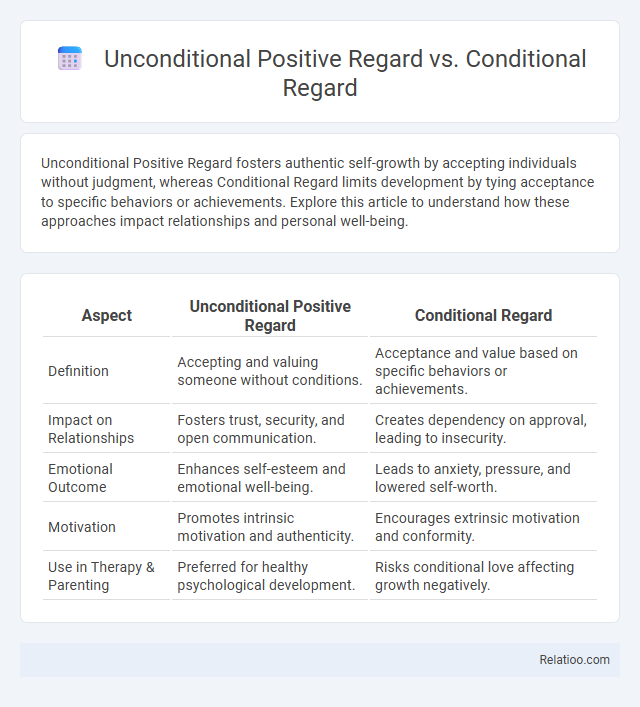Unconditional Positive Regard fosters authentic self-growth by accepting individuals without judgment, whereas Conditional Regard limits development by tying acceptance to specific behaviors or achievements. Explore this article to understand how these approaches impact relationships and personal well-being.
Table of Comparison
| Aspect | Unconditional Positive Regard | Conditional Regard |
|---|---|---|
| Definition | Accepting and valuing someone without conditions. | Acceptance and value based on specific behaviors or achievements. |
| Impact on Relationships | Fosters trust, security, and open communication. | Creates dependency on approval, leading to insecurity. |
| Emotional Outcome | Enhances self-esteem and emotional well-being. | Leads to anxiety, pressure, and lowered self-worth. |
| Motivation | Promotes intrinsic motivation and authenticity. | Encourages extrinsic motivation and conformity. |
| Use in Therapy & Parenting | Preferred for healthy psychological development. | Risks conditional love affecting growth negatively. |
Understanding Unconditional Positive Regard
Unconditional Positive Regard (UPR) emphasizes accepting and valuing individuals without judgment or conditions, fostering a supportive environment crucial for personal growth and self-acceptance. Unlike Conditional Regard, which depends on meeting specific expectations or behaviors, UPR promotes psychological safety by embracing a person's intrinsic worth irrespective of their actions. A Nonjudgmental attitude aligns closely with UPR by suspending criticism and creating empathetic understanding, essential in therapeutic and interpersonal contexts.
Defining Conditional Regard
Conditional regard refers to showing approval or affection only when specific behaviors or outcomes meet certain expectations, often leading to external motivation rather than genuine self-worth. Unlike unconditional positive regard, which involves accepting and valuing you without conditions, conditional regard can create pressure and anxiety by tying worth to performance or compliance. A nonjudgmental attitude differs by fostering an open, accepting mindset that refrains from assigning value or blame, promoting authentic self-exploration and growth.
Historical Origins and Key Theorists
Unconditional positive regard, a concept introduced by Carl Rogers in the 1940s, emphasizes accepting and valuing Your experiences without judgment, fostering personal growth in humanistic psychology. Conditional regard, contrasted by Edward Deci and Richard Ryan in Self-Determination Theory, involves valuing based on meeting specific conditions which can hinder authentic self-development. The nonjudgmental attitude, rooted in Buddhist mindfulness practices and incorporated into Western psychology by Jon Kabat-Zinn, promotes open acceptance of thoughts and feelings without evaluation, supporting emotional regulation and mental well-being.
Psychological Impact on Self-Esteem
Unconditional Positive Regard fosters a secure sense of self by making You feel valued without prerequisites, enhancing self-esteem and emotional resilience. Conditional Regard ties self-worth to external achievements or behaviors, often leading to anxiety and fragile self-esteem due to constant need for validation. A Nonjudgmental Attitude promotes acceptance of one's thoughts and feelings, reducing self-criticism and supporting a stable and compassionate self-view.
Effects on Relationships and Communication
Unconditional Positive Regard fosters trust and open communication by accepting others without judgment, enhancing emotional safety and intimacy in relationships. Conditional Regard can create pressure and insecurity, as approval depends on meeting specific expectations, often leading to misunderstandings and reduced authenticity in interactions. A Nonjudgmental Attitude encourages empathy and active listening, promoting honest dialogue and stronger connections by valuing your feelings without criticism.
Role in Child Development and Parenting
Unconditional Positive Regard fosters a child's self-esteem and emotional security by accepting them without judgment, promoting healthy psychological growth and resilience. Conditional Regard ties a child's worth to specific behaviors or achievements, potentially leading to anxiety, low self-worth, and dependence on external validation. A Nonjudgmental Attitude encourages open communication and trust, allowing Your child to explore feelings and thoughts safely, which supports emotional regulation and positive parent-child relationships.
Unconditional vs Conditional Regard in Therapy
Unconditional Positive Regard in therapy involves accepting and valuing Your experiences without judgment or conditions, fostering a safe environment for genuine self-exploration and growth. In contrast, Conditional Regard depends on meeting specific expectations or behaviors, which can create pressure and hinder authentic self-expression. Emphasizing Unconditional Positive Regard helps build trust and promotes emotional healing, while Conditional Regard may limit therapeutic progress by tying acceptance to performance.
Social and Cultural Perspectives
Unconditional Positive Regard emphasizes acceptance of individuals regardless of behavior, fostering inclusive social environments that support mental well-being across diverse cultures. Conditional Regard, often rooted in cultural norms, ties approval to specific behaviors or achievements, potentially limiting personal expression and reinforcing social conformity. Adopting a nonjudgmental attitude encourages open communication and empathy, allowing you to navigate cultural differences with sensitivity and respect for unique social identities.
Challenges and Misconceptions
Unconditional Positive Regard is often misunderstood as permissiveness, leading to challenges in maintaining boundaries while offering consistent support. Conditional Regard can create dependency and hinder authentic self-expression because it ties approval to specific behaviors, which might leave Your emotional well-being vulnerable to external judgments. A Nonjudgmental Attitude is sometimes mistaken for indifference, making it difficult for individuals to balance empathy with necessary accountability in relationships.
Fostering Unconditional Positive Regard in Daily Life
Fostering unconditional positive regard in daily life involves expressing consistent acceptance and support without evaluating others based on their actions or characteristics, which promotes emotional safety and authentic self-expression. Unlike conditional regard that ties acceptance to specific behaviors or achievements, unconditional positive regard nurtures growth by valuing the individual as inherently worthy. Cultivating a nonjudgmental attitude enhances this process by reducing biases and allowing empathy to flourish, contributing to healthier interpersonal relationships and psychological well-being.

Infographic: Unconditional Positive Regard vs Conditional Regard
 relatioo.com
relatioo.com